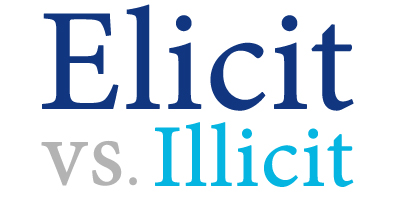Some homophones, similar-sounding words that don’t mean the same thing, are harmless. But elicit and illicit are not among them.
They are completely different parts of speech; choosing the wrong one would be an embarrassing mistake. Moreover, it could mean the difference between asking for a response and instigating dangerous criminal activity.
With that important warning in mind, how should you use illicit or elicit in your writing? There is an easy way to decide. Continue reading for a discussion of these two confusing homophones.
What is the Difference Between Elicit and Illicit?
This article compare elicit vs. illicit. I will use each word in an example sentence to demonstrate its proper use.
Plus, I will give you a useful trick to help you remember whether to use elicit or illicit, depending on your meaning.
When to Use Elicit
 What does elicit mean? Elicit is a verb. It is a synonym of evoke, where that word has the meaning to draw out.
What does elicit mean? Elicit is a verb. It is a synonym of evoke, where that word has the meaning to draw out.
For example,
- The disruption, though annoying, was not enough to elicit a response from the judge.
- The company commissioned a survey to elicit the public’s views on the newest flavor of its sour candies.
- Let us interview the witnesses to elicit the facts of the case.
- Specific projects are not the only target of NIMBYism. Proposed zoning and land-use regulation changes likewise elicit strong reactions and resistance. –The Washington Post
When to Use Illicit
 What does illicit mean? Illicit is an adjective. It means illegal or otherwise forbidden. You can see examples of this word’s use in the sentences below.
What does illicit mean? Illicit is an adjective. It means illegal or otherwise forbidden. You can see examples of this word’s use in the sentences below.
- The cartel used buckets of batter to traffic illicit drugs into other countries.
- The pawn shop’s owner is on trial for selling illicit goods in his store.
- The car enthusiasts held an illicit race on Beachside Avenue at 1:00am.
- What’s missing, former Losers tell The Post, is any examination of the show’s secret and brutal tactics, which include providing illicit drugs to contestants and submitting them to questionable medical exams by the show’s resident doctor, Rob Huizenga, known as “Dr. H.” –New York Post
Trick to Remember the Difference
 Here is a helpful trick to remember illicit vs. elicit.
Here is a helpful trick to remember illicit vs. elicit.
- Illicit is an adjective that means illegal.
- Elicit is a verb that means evoke.
If the word you are using is an adjective, you probably mean illicit. Elicit is never an adjective.
If you are trying to use the word as a verb, you should use elicit. Much in the same way elicit is never an adjective, illicit is never a verb.
You can remember the difference between these words by remembering their synonyms. Both illicit and illegal begin with the letter I, and both elicit and evoke begin with the letter E.
Summary
Is it elicit or illicit? While these two words sound the same when spoken, the mean very different things.
- Elicit is a verb, and a synonym of evoke.
- Illicit is an adjective, and a synonym of illegal.
- Neither word is ever used as any other part of speech.
Since elicit and evoke both start with the same letter, much the same as illicit and illegal, pairing these words with their synonyms will help you remember which is which, and in what contexts they should be used.
Now that you know the difference between these words, you can be confident that your writing will not suffer from this simple mistake. Any time you have questions about other confusing words, you can check this site for an explanation.
Contents
